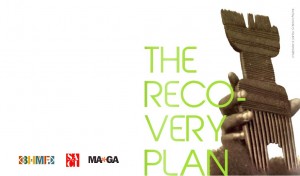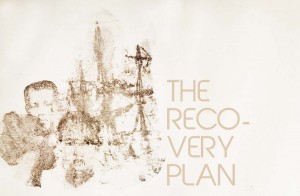ENG
We are truly happy to be presenting the second Pop up of The Recovery Plan with the Museo Ma*GA in Gallerate. This institutional occupation consists of 5 solo exhibitions and a library on loan.
ITA
Siamo veramente felici di preparare il secondo Pop up di The Recovery Plan con il Museo Ma * GA di Gallerate. Questa occupazione istituzionale consiste in 5 mostre personali e una biblioteca in prestito (library on loan).
Press Statement:
ENG
The Recovery Plan @ MA*GA
Young Gifted and Black Italians:
Binta Diaw, Victor Fotso Nyie, Francis Offman, Raziel Perin, Emmanuel Yoro Gallagher
A research project of Black History Month Florence
by BHMF in collaboration with Simone Frangi
Starting from October MA*GA hosts an activation of The Recovery Plan, an itinerant cultural center, founded by BHMF - Black History Month Florence and dedicated to the promotion of Afro-descendent cultural productions in the Italian context.
During the four months of activity at Gallarate, The Recovery Plan @ MA*GA presents, one after the other, five exhibition and research projects, carried out by the artists Binta Diaw, Victor Fotso Nyie, Francis Offman, Raziel Perin, Emmanuel Yoro Gallagher as the result of the first edition of YGBI - Young Gifted and Black Italians, residency and training program dedicated to young Italian Afro-descendant artists born from a collaboration between BHMF, OCAD - Ontario College of Art and Design and The Student Hotel.
Conceived as a collective and dialogic project, YGBI in February 2020 five Afro-Italian artists to spend ten days together gathered in Florence working in the OCAD studios. The studio experience was supervised and guided by international curator Andrea Fatona, professor at OCAD, together with leaf jerlefia, curator and artist.
Each exhibition presented at MA*GA is accompanied by an Afro-descendant researcher - Simao Amista, Jordan Anderson, Angelica Pesarini, Jessica Sartiani, Patrick Joel Tatcheda Yonkeu - who will have the task of developing the conceptual content of the exhibition with the artist. These collaborations will be assisted by artist-researcher Alessandra Ferrini.
Thanks to the support of SACI- Studio Arts College International and the participation of Penn State University and Oberlin College, the project is developed in parallel with a series of lectures and online seminars addressed to university students.
ITA
The Recovery Plan @ MA*GA
Young Gifted and Black Italians:
Binta Diaw, Victor Fotso Nyie, Francis Offman, Raziel Perin, Emmanuel Yoro Gallagher
Un progetto di ricerca di Black History Month Florence
a cura di BHMF in collaborazione con Simone Frangi
A partire da Ottobre il MA*GA ospita un’attivazione di The Recovery Plan, centro culturale itinerante, fondato da BHMF - Black History Month Florence e dedicato alla promozione nel contesto italiano delle produzioni culturali afro-discendenti.
Nell’arco dei quattro mesi di attività a Gallarate, The Recovery Plan @ MA*GA presenta, uno dopo l’altro, cinque progetti espositivi e di ricerca, portati avanti dagli artisti Binta Diaw, Victor Fotso Nyie, Francis Offman, Raziel Perin, Emmanuel Yoro Gallagher e frutto della prima edizione di YGBI - Young Gifted and Black Italians, residenza e training program dedicato a giovani artisti afro-discendenti italiani nato da una collaborazione tra BHMF, OCAD - Ontario College of Art and Design e The Student Hotel.
Pensata come un progetto collettivo e dialogico, YGBI ha radunato a Firenze nel Febbraio 2020 cinque artisti afro-italiani a trascorrere dieci giorni insieme e lavorare negli studi di OCAD. L’esperienza in studio è stata supervisionata e guidata dalla curatrice internazionale Andrea Fatona, professoressa all’OCAD, insieme a leaf jerlefia, curatrice e artista.
Ogni mostra presentata a MA*GA è accompagnata da un ricercatore o una ricercatrice afro-discendente - Simao Amista, Jordan Anderson, Angelica Pesarini, Jessica Sartiani, Patrick Joel Tatcheda Yonkeu - che avrà il compito di sviluppare con l’artista il contenuto concettuale della mostra. Queste collaborazioni saranno coadiuvate dall’artista-ricercatrice Alessandra Ferrini.
Grazie al sostegno di SACI- Studio Arts College International e alla partecipazione di Penn State University e Oberlin College, il progetto si sviluppa in parallelo ad una serie di lectures e seminari online indirizzati a studenti universitari.
Exhibitions/MOSTRE
ENG
October 3- 18 2020
The Recovery Plan @ MA*GA - Vol. 1
Raziel Perin, A Tale of Tamarindo
Associated researcher: Simao Amista
Through his artistic practice - syncretism of drawings, symbolic voodoo, organic sculptures with digital grafts and mixed media installation techniques - Raziel Perin extends and re-appropriates rituals linked to the popular beliefs and the mysticism of his birthplace, Santo Domingo, and the echoes and influences that have been filtered down to him in Italy through the weft of his family's diaspora. The research for A Tale of Tamarindo originates in the study of the history of Santo Domingo and an awareness of some of the contradictions rooted in this society (as well as in Italy) such as the rejection of Black inheritance and the demonization of practices related to popular cults born in plantations.
ITA
dal 3 Ottobre 2020 al 18 Ottobre 2020
The Recovery Plan @ MA*GA - Vol. 1
Raziel Perin, A Tale of Tamarindo
Ricercatore associato: Simao Amista
Attraverso la sua pratica - sincretismo di disegni, simbolica voodoo, sculture organiche con innesti digitali e tecniche installative miste - Raziel Perin approfondisce e si riappropria di alcuni rituali legati alle credenze popolari e al misticismo della sua terra di nascita, Santo Domingo, e di echi e influenze che giungono filtrati sino a lui in Italia nelle maglie della diaspora della sua famiglia. Il lavoro di ricerca per A Tale of Tamarindo origina nello studio della storia di Santo Domingo e dalla presa di coscienza di alcune contraddizioni radicate nella sua società (così come in Italia) come il rifiuto dell'eredità nera e la demonizzazione delle pratiche legate a culti popolari nati nelle piantagioni.
ENG
24 October 2020 to 8 November 2020
The Recovery Plan @ MA*GA - Vol. 2
Binta Diaw, Nero Sangue
Associated researcher: Angelica Pesarini
Nero Sangue is an installation that reflects on the systematic violence experienced by the black bodies of migrants and workers in tomato fields. The exhibition was born from research that elaborates a link between the organicity of the tomato and that of the black body. The latter, harvesting raw material, in conditions of extreme precariousness and vulnerability, becomes part of a loop: a vortex that overwhelms and engages physically and mentally in a state of "mechanical exploitation".
With Angelica Pesarini, an interest was developed in bringing out the intense connection that unites the colonial, fascist Italian past and the current racial, physical, verbal and psychological violence suffered by migrants today. The research is sustained by a re-reading of the tragic events of recent years, which see multi-digit numbers of migrants dead and killed by a system under the name of the Italian Nation.
ITA
dal 24 Ottobre 2020 al 8 Novembre 2020
The Recovery Plan @ MA*GA - Vol. 2
Binta Diaw, Nero Sangue
Ricercatrice associato: Angelica Pesarini
Nero Sangue è un’installazione che riflette sulla sistematica violenza esperienziata dai corpi neri di migranti e lavoratori nei campi di pomodori. La mostra nasce da una ricerca che vede un legame tra l’organicità del pomodoro e quella del corpo nero.?Quest’ultimo raccogliendo la materia prima, in condizioni di estrema precarietà e vulnerabilità, entra a far parte di un loop: un vortice che che lo travolge e coinvolge fisicamente e mentalmente in uno stato di “sfruttamento meccanico”.
Con Angelica Pesarini, nasce un interesse nel far emergere l’intensa connessione che unisce il passato coloniale, fascista Italiano e l’attuale violenza razziale, fisica, verbale e psicologica subita dai migranti e dalle migranti di oggi. La ricerca verrà sostenuta da una rilettura delle tristi vicende accadute negli ultimi anni, che vedono numeri a più cifre di migranti morti e uccisi da un sistema sotto il nome di Nazione Italiana.


